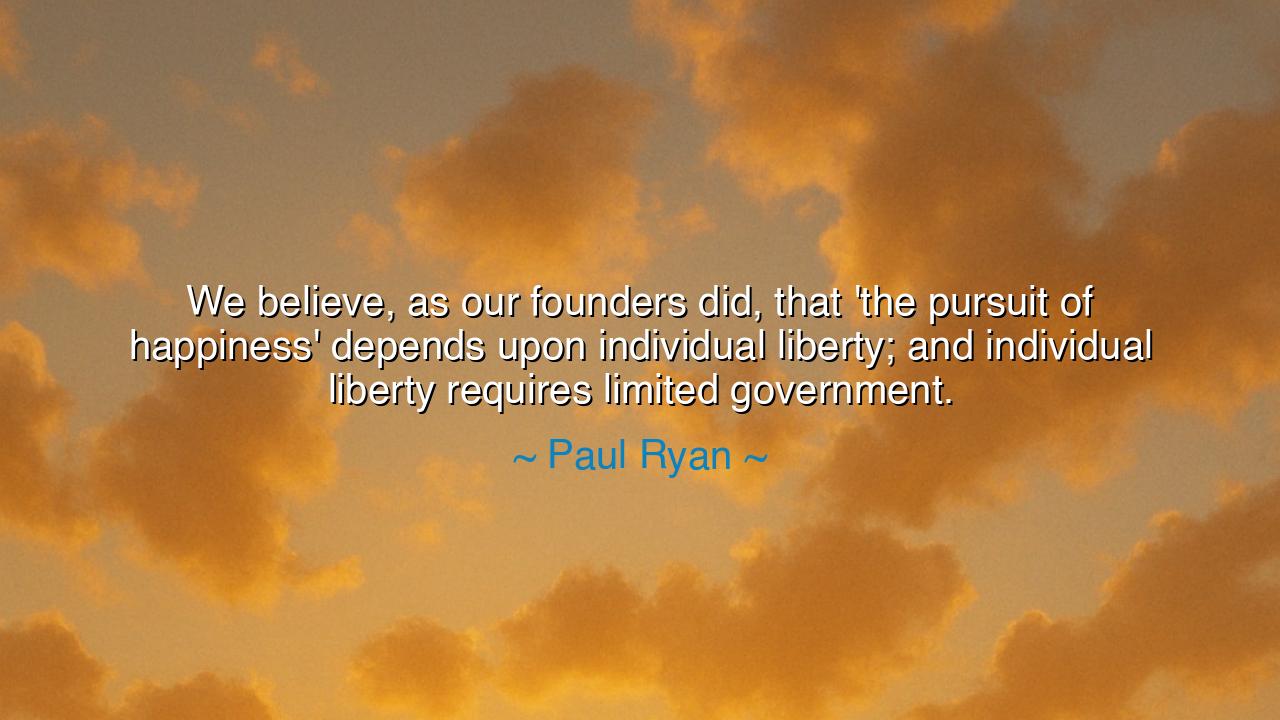
We believe, as our founders did, that 'the pursuit of happiness'
We believe, as our founders did, that 'the pursuit of happiness' depends upon individual liberty; and individual liberty requires limited government.






When Paul Ryan declared, “We believe, as our founders did, that 'the pursuit of happiness' depends upon individual liberty; and individual liberty requires limited government,” he summoned the eternal spirit of the American Revolution — that sacred covenant between freedom and responsibility, between the dignity of the individual and the restraint of power. His words echo across centuries, carrying the same truth that guided Jefferson, Madison, and Washington: that the soul of human happiness cannot breathe in the suffocating air of control. It flourishes only when men and women are free to choose, free to strive, and free to fail and rise again.
The origin of this idea lies in the Declaration of Independence, where Jefferson wrote that all men are endowed by their Creator with “certain unalienable Rights,” among them “Life, Liberty and the pursuit of Happiness.” Yet Jefferson and his peers understood that liberty is not chaos — it is order bound by principle. To preserve freedom, they built a government designed not to dominate, but to restrain itself; not to command, but to protect. Ryan’s statement revives that wisdom, reminding us that limited government is not the enemy of happiness, but its guardian. When power grows without limit, liberty withers — and with it, the very pursuit that gives life its meaning.
History’s pages are heavy with the ruins of those who forgot this truth. In the French Revolution, noble cries for liberty descended into tyranny when unchecked power replaced principled restraint. The dream of equality became the terror of the guillotine. The people, seeking happiness through the state, found themselves enslaved by it. The founders of America learned from such tragedies — they knew that liberty requires boundaries, that freedom without limits becomes anarchy, and power without checks becomes despotism. Thus they forged a system where government’s reach would be measured, its ambition curbed, and its duty confined to protecting, not providing, happiness.
Ryan’s warning is especially poignant in an age where many look to government as the source of prosperity rather than its protector. His words call us back to first principles — to remember that the pursuit of happiness is an individual journey, not a collective entitlement. The state can defend your rights, but it cannot give you virtue, creativity, or purpose. Those are born within the human heart. Every time government grows to solve all problems, it takes a portion of the citizen’s will, until the soul forgets how to strive. Thus, as Ryan reminds us, liberty and limited government are not political slogans, but conditions for human flourishing.
Consider the story of Hong Kong in the 20th century. With minimal regulation and maximum economic freedom, a barren rock became one of the most prosperous regions on Earth. Its people were not granted happiness by decree — they pursued it through liberty, through hard work, enterprise, and the right to choose their own destiny. Yet as that freedom was gradually constrained, the spirit that built Hong Kong began to fade. This living example reveals a truth older than any nation: where freedom is guarded, prosperity grows; where power consolidates, happiness declines.
Beneath Ryan’s words lies also a spiritual insight — that liberty is sacred because it honors human dignity. To be free is to stand as a moral being before one’s Creator, accountable for one’s own choices. When government grows too large, it subtly denies that sacred responsibility, treating the citizen as a ward rather than a steward. But liberty, rightly understood, demands courage — the courage to live without the safety of command, the courage to build one’s own future. It is not comfort that liberty promises, but the chance to become.
The lesson, then, is clear: if we wish to preserve the pursuit of happiness, we must protect individual liberty, and if we wish to preserve liberty, we must limit government. This is not cynicism — it is wisdom born from centuries of struggle and sacrifice. Each generation must resist the sweet temptation of dependency and remember that the surest path to happiness is self-determination. Govern lightly, live boldly, and hold power in check, for no authority — however well-intentioned — can replace the creative fire of a free people.
Thus, let Ryan’s words ring as both a warning and a blessing to the future: happiness is not bestowed; it is earned through liberty. And liberty is not sustained by chance; it is preserved by restraint. Guard it, nourish it, and never surrender it to the comfort of control. For the day you trade freedom for safety, you will awaken to find that you have lost not only both — but the very soul of the pursuit of happiness itself.






AAdministratorAdministrator
Welcome, honored guests. Please leave a comment, we will respond soon